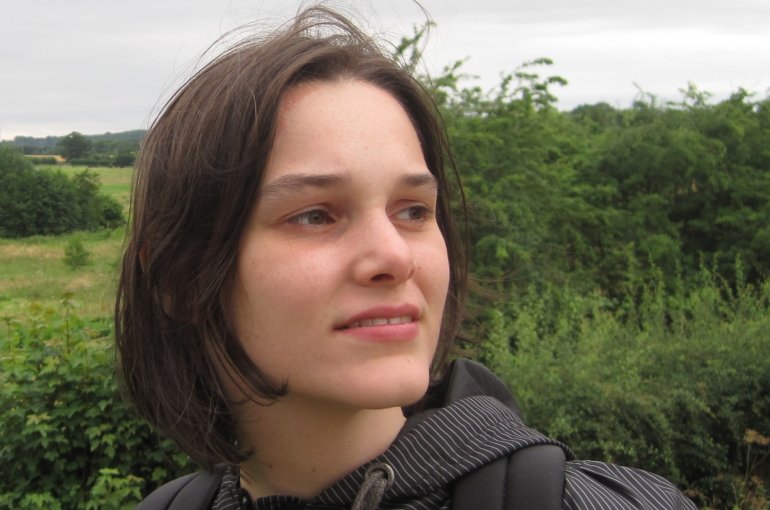“I'm always looking for ways to learn more.”

In 2017, Hanneke Schroten (23) started the double Bachelor's programme in Physics and Mathematics at Utrecht University. Since November 2020, she is the new coordinator of Studying without Limitations, a peer to peer platform for students with a disability at Utrecht University. Hanneke: "If you give people time and space to settle in and see what they need, you can also get a lot back."
You are the new coordinator for Studying without Limitations, how did that come about?
“After I was a little bit shy as a freshman, I started to get involved with my fellow students. I joined the education advisory committee of the Department of Physics, which I really enjoyed. After that, I transferred to the student consultations of the Department of Mathematics. From that position, I was also the link to the education committee of the Faculty of Science. Because I am entitled to extra examination time myself, I came in contact with the platform Studying without Limitations. I have the extra examination time provision because I prefer to take my exams in a room with fewer people, because I then receive fewer stimuli. First, I became a member of the platform. When I heard from the coordinator Richard Horenberg that he was looking for a successor, I gradually took over that task from him.”
Do you have a personal mission as the coordinator?
“Yes. What I would like to make an extra effort for is the provision of information, because the information about studying with a disability is sometimes scattered and hard to find. Especially now that you can't physically visit the university, it is important that you can find what you are looking for online. I am very assertive myself; I follow up on everything and pull everyone's jackets, but I notice that not everyone is like that. People without disabilities can also struggle with assertiveness, but I notice that the students with disabilities really need to know more about what is available.
For example, the provision for extra exam time is fairly well known, but not all students are aware that you can go to your student advisor for support. It is important that you can work with the study advisor to assess what is needed in terms of facilities and that the study advisor also knows what is possible. As a platform, we also want to work on our visibility. We have noticed that students are increasingly more able to find us because we have been present at open days for a number of years.
Personally, I find coordinating the platform challenging and educational. I have quite a lot of one-on-one conversations with students, in which I try to assess what they need. This way, I also learn more about conversation management. Actually, I'm always looking for ways to learn more and this position is a good place to do that.”
What is it like for you to study with a disability?
“What I really like about studying at Utrecht University is that you get the option to choose when to take which course. That's not possible everywhere. There are of course mandatory courses at the Faculty of Science, but it is not exactly set in stone which courses you have to follow within a year. You can choose to take it a little slower. For example, I have spread out my courses over 4 years. In addition, the guidance I receive from my study advisor, Marian Brands, is very helpful to me personally.”
Within the Equality, Diversity & Inclusion Office, we sometimes use the term 'neurodiversity'. This means that there is diversity between people; also neurologically, but that this can actually be enriching . What is your position on the term 'neurodiversity'?
“We at Studying without Limitations always use the term 'disability', in line with the Utrecht University texts on facilities. We do use a slightly broader definition of 'disability' than Utrecht University. Within Utrecht University's definition, there is talk of a 'chronic disorder'. However, the platform also welcomes students who, for example, have temporary mental problems.
I notice that having a disability can sometimes be difficult, but it makes you work differently sometimes and that can also lead to new insights or talents. For example, I am good at analytical thinking. I think strongly in patterns and I often try to make things more abstract. Sometimes, I need some time and adjustments to come out well. In secondary school, for example, I had a modified schedule with fewer hours. I was a fast learner, but a full schedule took too much energy out of me. I was lucky to have the right people around me who noticed. If people invest in me at the beginning and dare to make an exception, it also produces results, because I graduated cum laude from high school. Now that I am studying at the university, I also notice that support helps and that I can pick up all kinds of things besides my studies.”
By inclusion correspondent Myra-Lot Perrenet
March is the Equality, Diversity & Inclusion month
The pub quiz is part of the Equality, Diversity & Inclusion month. The programme Equality, Diversity & Inclusion organises various (online) activities in March, such as lectures and (creative) workshops for students, employees, alumni and other interested parties. Read more about these activities.

